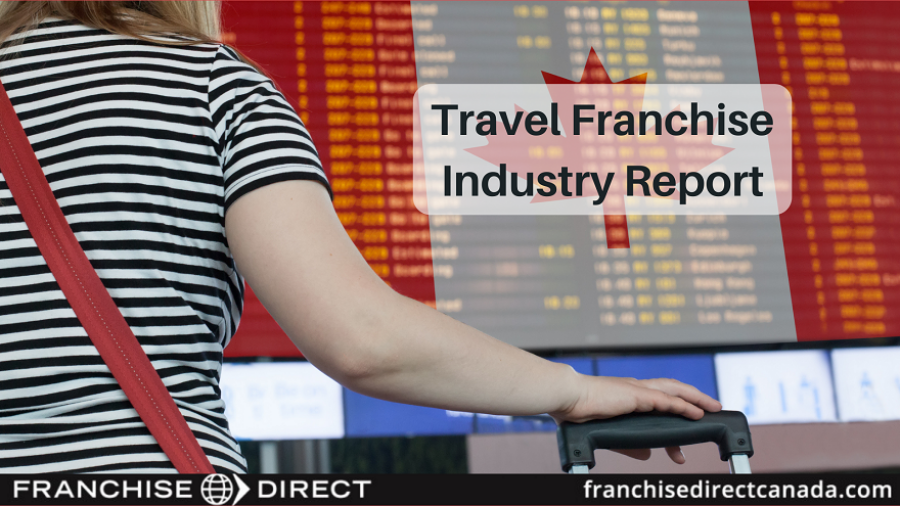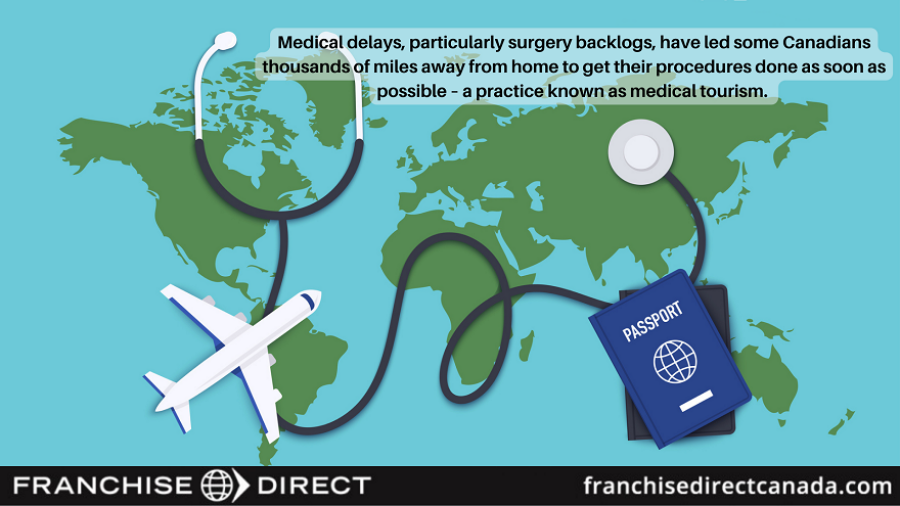🕒Estimated Reading Time: ~7 minutes

People like to vacation, and travel franchises help make that dream a reality by simplifying the sometimes convoluted task of planning a trip, whether it be for solo exploration, group travel, family travel, or otherwise.
The travel franchise industry covers many franchise types, offering a diverse set of franchise opportunities to choose from, including:
- Car Rental Franchises
- Cruise Franchises
- Hotel Franchises
- Recreation and Entertainment Franchises
- Rental Property Management
- Travel Agency Franchises
- Travel Consultant Franchises
And wannabe travel franchisees are in luck. Following the unprecedented dip caused by the pandemic, people are ready to travel again.
According to the 2023 version of American Express Travel’s Global Travel Trends Report, 52% of respondents plan to take more trips this year than last year, while another 50% revealed plans to spend more money on travel in 2023.
The report also showed that Millennials and Gen Z are two important generations to focus on as 84% of Gen Z and Millennials said they would rather take a dream vacation than buy a new luxury item, and 79% agreed that travel is an important budget priority.
The following includes summaries of a few trends affecting the travel franchise industry, as well as some keys to keep in mind when buying a travel franchise.
Increased Travel on the Seas
Cruise travel is a chance for relaxation and/or exploration that is available to travelers at most cost levels, from budget travelers to luxury travelers.
According to the Cruise Line International Association (CLIA), cruising continues to be one of the fastest growing sectors of travel and tourism and is rebounding nicely from pandemic lows. Per the association’s State of the Cruise Industry Report 2023, cruise tourism is forecasted to reach 106% of its 2019 levels.
Further, customer intent to cruise is also up. Eighty-five percent of those surveyed by CLIA expressed their intent to cruise again. That percentage is 6% higher than it was pre-pandemic.
For Canada specifically, the Port of Vancouver experienced a record number of cruise ship visits in 2022. Per a news release, the Port of Vancouver welcomed a record 307 cruise ship visits in 2022, an increase of 7% compared to 2019. While of the Atlantic side, 2022 figures showed a an increase of 24% from the 2019 figures.
Cruise franchises are especially attractive for those who like to work from home. According to Statista Mobility Market Insights, 29% of total revenue will be generated through online sales by 2027 in the cruises segment.
The Rise of Medical Tourism for Canadians
In 2021, Canadians faced a median waiting time of 25.6 weeks between referral from a general practitioner and the receipt of the treatment, according to a report from the Fraser Institute. The length of time was “the longest wait time recorded in this survey’s history and is 175 percent longer than in 1993, when it was just 9.3 weeks.”
The delays, particularly surgery backlogs, have led some Canadians thousands of miles away from home to get their procedures done as soon as possible – a practice known as medical tourism.
The practice is becoming so common, Canada’s federal government even has a page providing advice though, currently, there is no government intervention or regulation. In part, the government strongly suggests keeping in mind hospital accreditation and licensing standards along with drug regulations among other things when considering travelling abroad for medical care.

Medical tourism is not a new phenomenon. There is evidence of it dating back to the ancient Greeks and Romans. However, for a long time it was mostly people travelling to more economically developed countries. Now, people from more economically developed countries are travelling abroad for medical and dental care.
As with any industry, once an issue arises business opportunities will be founded to address it. In the area of medical tourism one of those opportunities is Passport Medical International. (Note: Passport Medical International is technically a business opportunity, not a franchise.)
Passport Medical International, and other opportunities like it, is a full-service medical tourism facilitator whose franchisees function as concierges for their customers, helping them navigate the options and potential pitfalls. Since its founding in 2009, the company has worked with over 3,000 patients “from the initial consultation to post-procedure follow-up care.”
Keep an Eye on Business Travel Increases Too
Travel is not all leisure. In fact, pre-pandemic, business travel accounted for nearly half of the travel market. Businesspeople and their companies regularly rely on travel professionals—like those with travel franchises—to help manage their important business travel.
The Global Business Travel Association predicts the $1.4 trillion in spend will now return in 2026. That $1.4 trillion represents the high the industry reached in 2019.
Business travel significantly impacts several pieces of the travel and hospitality industry puzzle. It utilizes multiple business providers for each event, such as travel agencies, airlines, lodging, conference and entertainment venues, restaurants, transportation providers, etc. Of these, how airlines are faring is generally a solid indicator of where the market is at currently and the direction it is headed.
Air Canada noted a business travel bounce back starting in early 2022. However, it accelerated after COVID-19 border measures ended for all travelers entering or returning to Canada by air, land, or sea (October 1, 2022).
In a mid-2022 Reuters interview, Air Canada Chief Commercial Officer Lucie Guillemette was quoted saying, “We’re certainly not close to 2019 levels yet, but we are thinking that, based on what we’re seeing, most probably by the time we hit Labor Day [2022], or get into 2023 it should be quite close.”
The airline has forecasted overall capacity to be 85% to 90% of 2019 levels by summer 2023, and about 90% to 95% capacity restored by summer 2024. Air Canada has also projected a return to pre-pandemic levels of profitability by 2024.
Business analysts are also intrigued by the potential impact of “digital nomads” on the business travel industry. Digital nomads are defined as long-term travelers that live and work anywhere aided by the rise of work-from-home and the continued advancement of technology. These workers could have a significant impact on the industry going into the future. In fact, many hotel brands are considering the needs of the blended or “bleisure” traveler, someone who combines business with leisure travel.
Buying a Travel Franchise
When you’ve selected a franchise opportunity you’re interested in and you’re ready to take the next step in your franchise buying journey, it’s time to take a close look at all the provisions and fees related to the investment.
Initial Investment
Like all franchise segments, the investment necessary to open a travel franchise varies depending on the unique business system. Factors that can influence investment costs include business permit costs, real estate costs (if any), necessary equipment, grand opening advertising and marketing expenses, and more.
Our franchise profiles will present you with a basic range for the initial investment or minimum cash required to open a franchise. But when it comes to finding out the details of an initial investment, the Franchise Disclosure Document (FDD) for that franchise is the best place to look. Franchisors offer itemized estimates in their FDD based upon their experience establishing and, in some cases, operating units. However, not all provinces require an FDD. Here is a list of those that do.
Keep in mind these estimates are just that, though—an estimate. Prospective franchisees should review the figures presented with a business advisor, taking into consideration their unique circumstances, before making the decision to enter into a franchise agreement.
Ongoing Costs
Don’t forget about the additional costs required for virtually all franchise businesses. This includes expenses such as royalty fees, marketing fees, software fees, training fees, and more.
The most common is the royalty fee. Royalty fees are assessed for the continued use of the franchisor’s trademarks and patented processes, along with certain types of operational support.
In addition to regularly assessed fees, other fees are charged on an “as needed” basis such as audit fees, costs for optional training, and more. Further, franchise owners will also need to budget for normal business operating costs such as payroll, utilities, maintenance, and insurance fees.
Before investing, prospective franchisees should take the time to carefully review a franchisor’s FDD for more detailed information on all systems, procedures, and costs.
--
To view travel franchises that may be right for you, please visit our travel franchise opportunities page.














